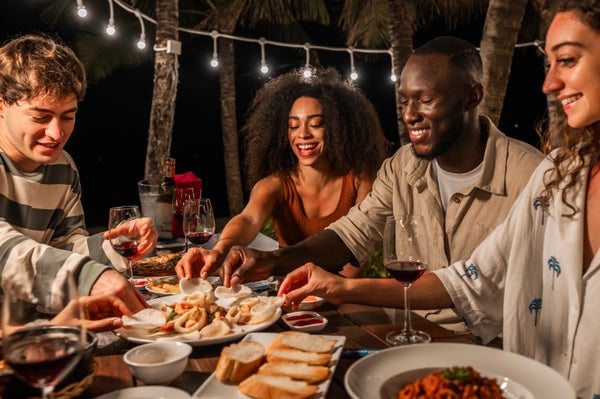November 27, 2024
3 min be taught
Your Associates Kind Your Microbiome—And So Do Their Associates
Analysis of virtually 2,000 people residing in distant villages in Honduras reveals who’s spreading gut microorganisms to whom

Associates share additional than merely meals as soon as they dine collectively.
A shared meal, a kiss on the cheek: these social acts convey people collectively — and produce their microbiomes collectively, too. The additional people work collectively, the additional associated the make-up of their gut microorganisms iseven when individuals don’t dwell within the equivalent household, a analysis displays.
The analysis moreover found that a person’s microbiome is fashioned not solely by their social contacts however as well as by the social contacts’ connections. The work is definitely certainly one of quite a few analysis that enhance the probability that properly being conditions could also be fashioned by the transmission of the microbiome between individuals, not just by weight reduction program and totally different environmental elements that affect gut flora.
Inside the quest to know what shapes a person’s microbiome, social interactions are “positively a little bit of the puzzle that I really feel has been missing until recently”, says microbiologist Catherine Robinson on the Faculty of Oregon in Eugene, who was not involved throughout the work.
On supporting science journalism
In case you occur to’re having enjoyable with this textual content, ponder supporting our award-winning journalism by subscribing. By shopping for a subscription you are serving to to verify the way in which ahead for impactful tales regarding the discoveries and ideas shaping our world instantly.
The evaluation was revealed in Nature on 20 November.
What’s mine is yours
The analysis has its roots in evaluation revealed just about 20 years up to now that investigated how weight issues spreads in social networks. Certain viruses and micro organism found throughout the gut microbiome are recognized to fluctuate a person’s hazard of weight issuesand social scientist Nicholas Christakis puzzled whether or not or not buddies cross these microbes to at least one one other together with influencing each other’s consuming habits. “This was a kernel of an idea that I merely couldn’t let go,” says Christakis, who is based at Yale Faculty in New Haven, Connecticut.
Since then, quite a few publications have advisable that social interactions kind the gut microbiome. Christakis and his colleagues travelled to the jungles of Honduras in order so as to add to this rising literature. There, they mapped the social relationships and analysed microbiomes of people residing in 18 isolated villages, the place interactions are primarily face to face and different individuals have minimal publicity to processed meals and antibiotics, which could alter the composition of the microbiome.
“This was an infinite endeavor,” Christakis says, on account of the workforce wanted to rearrange retailer in a distant location, then get the samples once more to america for processing.
Spouses and other people residing within the equivalent residence share as a lot as 13.9% of the microbial strains of their guts, nonetheless even people who don’t share a roof nonetheless habitually spend free time collectively share 10%, the researchers found. In distinction, people who dwell within the equivalent village nonetheless who don’t are more likely to spend time collectively share solely 4%. There could also be moreover proof of transmission chains — buddies of buddies share additional strains than could possibly be anticipated by chance.
The outcomes add depth to scientists’ understanding of what shapes the microbiomepartly on account of the workforce checked out subspecies of the gut microbes, says microbiologist Mireia Valles-Colomer at Pompeu Fabra Faculty in Barcelona, Spain, who was not involved throughout the work. Social contacts could share the equivalent microbial species by chance, nonetheless they’re loads a lot much less extra more likely to share the equivalent strains besides they’ve handed them to at least one one other.
Rethinking transmissibility
Evaluation like this “is altering totally the way in which wherein we count on”, on account of it signifies that hazard elements for conditions with hyperlinks to the microbiome, resembling hypertension and melancholycould unfold from particular person to particular person by way of their microbiomes, says computational biologist Nicola Segata on the Faculty of Trento in Italy. Segata was not involved throughout the current work, nonetheless he has labored with Valles-Colomer and members of Christakis’s workforce beforehand on associated evaluation.
Inside the case of melancholy, which can be powerful to cope with, combining present therapies with microbiome-targeting therapies could improve care, says Valles-Colomer.
Nonetheless people should not steer clear of social interactions for fear of “catching” others’ microbiomes. Social interactions can unfold components of healthful microbiomes and have myriad totally different benefits. Valles-Colomer says, “Shut contacts shouldn’t unhealthy for us. The opposite — they’re helpful!”
This textual content is reproduced with permission and was first revealed on November 20, 2024.












Leave a Reply